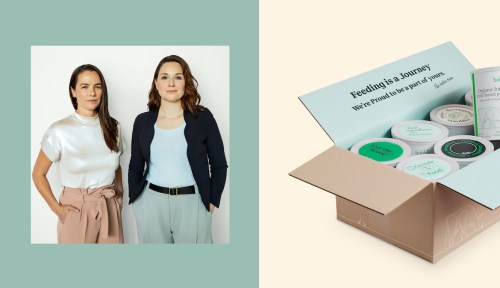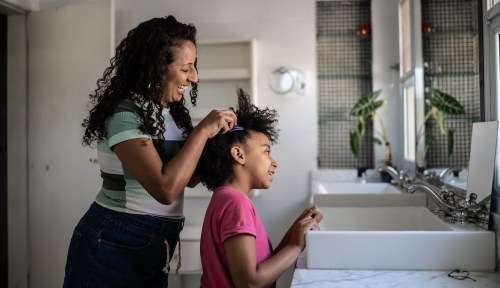Like many moms, I set high breastfeeding goals for myself during my first pregnancy. I aimed for the American Academy of Pediatrics’ recommendation of breastfeeding for at least one year and exclusively for the first six months in order to fully reap the extensive health benefits it provides to new mothers and babies. Where I live, in France, the average duration of breastfeeding is three months, and only 19 percent of babies are breastfed at six months—which is probably why the intake nurse at the hospital laughed out loud when I informed her of my plans.
When my daughter arrived, I cried every time she fed, until a lactation consultant taught me a hack for my cracked and bleeding nipples. I breastfed exclusively until she was 5 months old, at which point supply issues left her constantly screaming for more. I gave in to my husband’s pleas and added one supplemental bottle per day, which helped me nurse until her first birthday.
I’m not alone in struggling to meet the current breastfeeding recommendations; in the U.S., 58 percent of babies are breastfed at six months and 35 percent at one year, according to the Centers for Disease Control and Prevention (CDC). Between the gap of breastfeeding goals and reality, two warring camps have formed around “breast is best” and “fed is best,” sparring over how to best feed infants while meeting mom’s needs postpartum, too. The new infant formula company Bobbie (which launches today) hopes it can help change the conversation—and maybe even elevate the standards of infant formula in the U.S.
The polarization of formula vs. breast milk
Aside from nutrition, breastfeeding confers a variety of important health benefits for mom and baby, including stronger immune systems (for the baby) and reduced risk of postpartum depression and improved postpartum healing (for moms). But the emphasis in the U.S. on breastfeeding overlooks the reality that “not everyone can exclusively breastfeed,” says Laura Modi, Bobbie’s CEO and co-founder. In fact, about 10 percent of women cannot breastfeed because their milk never comes in or they have a medical contraindication.
For Modi, she had to stop breastfeeding her first child, who’s now 4.5 years old, five days after birth when mastitis (an inflammation of breast tissue sometimes linked to infection) caused her nipples to blister and bleed. “I was disappointed. As an Irish Catholic, I expected breastfeeding to be special and beautiful,” she says. “When you, as a mom, have to turn to something you’re told is second best, you feel guilty.” And choosing infant formula is often framed by health experts as acceptable only in “rare exceptions.”
Breastfeeding came more naturally with her second child, who’s 2 years old; she nursed exclusively for several months. And she’s formula-fed her third child, who’s 7 months old. “Now I look at my three kids, and I can’t tell the difference,” she says.
Modi believes breastfeeding and formula feeding have become polarized in the U.S. due to extreme positions from pro-formula lobbyists and pro-breastfeeding “lactivists.” On the one side, a few big formula companies have a shady historyof marketing formula. “They’re seen as wanting to drive profits over anything else,” Modi says. On the other side, breastfeeding proponents are armed with credible science on the benefits of breastfeeding, but well-intentioned efforts to center breastfeeding often make the act of feeding itself a moral decision. “The marketing is saying you should be breastfeeding, and if you’re not you’re not doing the right thing,” says Modi. The concept may even be dangerous if a mom refuses formula even when a baby isn’t getting enough to eat.
The first American “European-style” formula
But the stigma against formula goes beyond just how it stacks up to breastfeeding. Many parents feel added stress or shame about using formula to feed their babies because of perceptions about the products’ ingredients and quality (such as the use of high-fructose corn syrup or potentially inflammatory additives like carrageenan). For parents with means, these concerns drive them to a thriving black market, where parents can buy infant formulas only available in Europe. These parents (including Modi and many of her friends) believe that these products are higher-quality than what’s available in American formulas. “[European] standards are higher,” Modi says. (While some E.U. food safety standards are indeed stricter than those imposed by the FDA, pediatricians say science hasn’t shown that imported European formulas are better for babies, the New YorkTimes notes.)
Problem is, the black-market formulas are sold illegally through online third-party vendors you can’t necessarily trust. And European formulas haven’t been vetted for nutrition and safety by the FDA. Therein lies the (other) origin of Bobbie.
It wasn’t smooth sailing at first. Bobbie began selling its “European-style” toddler (not infant) formula in the U.S. in early 2019. This allowed the company to manufacture the product in Germany, which was easier than doing so in the U.S., and to skip the specific FDA standards required of infant formulas. “We decided, let’s just get the product out to see if we should invest to get it FDA-approved,” says Modi. After less than two weeks on store shelves, the FDA issued a consumer warning for parents to stop using Bobbie.
Modi says the FDA told Bobbie to clearly relabel the product as toddler formula—or to change the label, start manufacturing in the U.S., and apply for FDA approval. Bobbie put its sales on pause, shifted manufacturing to the U.S., and built a relationship with the FDA. It got FDA approval for its infant formula in September 2020, with a consumer launch scheduled for January 2021.
“I’m proud of what we’re putting in, also very proud of what left out…Simple and clean is much better,” Modi says of the product launching on January 5. She explains that Bobbie has the highest DHA (the most beneficial type of omega-3 fatty acid) on the market and uses organic pasture-raised dairy. The company adjusted the protein levels to mirror breast milk. And Modi says that unlike many other U.S. formula companies, Bobbie doesn’t use high fructose corn syrup. “I wouldn’t feed that to myself, and I wouldn’t feed it to my child,” Modi says. “I’m hoping we can do better.”
For now, the company is focused on formula. Modi hopes that within the next five to 10 years they’ll expand to products to feed babies through the first year of life. Hopefully, Bobbie will also be able to bring the cost of its formula down to be accessible to more people; currently, a 400-gram can costs $24. (In a press release, the company says that this is on-par with other organic infant formulas and less expensive than importing from Europe.)
Modi also hopes her company can begin to change the conversation around what it means to feed your child. “We have to share facts and studies in a way that moms can understand and give them confidence in whatever works for them,” says Modi. The company is starting that conversation via its inclusive baby feeding blog, Milk Drunk. But it’s the first step of many. “I believe it will be a long journey,” she says.
Other companies transforming infant formula
Bobbie isn’t the only brand looking to shake up the U.S. infant formula market, which is expected to reach $95 billion by 2026. BIOMILQ and TurtleTree Labs are two startups aiming to create breastmilk in the lab. The companies will collect milk-making stem cells (known as mammary epithelial cells) created during pregnancy and culture them to grow in a special nutrient-rich solution. The cells will then be stimulated to lactate, resulting in lab-formulated milk with the same nutritional components as breast milk. (Although the science seems far-fetched, it’s not all that different from technologies used in the vegan food industry at companies like Perfect Day or Just Foods.) Last June, Bill Gates’s investment firm supplied BIOMILQ with $3.5 million in Series A funding, while TurtleTree Labs received $3.2 million in investor funding.
Sugarlogix is yet another infant formula startup that’s working to develop “yeast-based technologies” to produce functional sugars, or human milk oligosaccharides (HMOs). HMOs are a type of prebiotic that’s thought to modulate the immune system and play a key role in helping to feed and nurture a baby’s developing gut microbiome, and they’re found only in human breast milk. The goal is to try and replicate some of those gut health benefits in a formula—an ambitious project for sure.
For now, however, Bobbie is the only startup formula on the market. If you’re interested in trying it out, you can sign up to get a free full-sized can (shipping not included) on Bobbie’s website starting on January 5th.
Oh hi! You look like someone who loves free workouts, discounts for cult-fave wellness brands, and exclusive Well+Good content. Sign up for Well+, our online community of wellness insiders, and unlock your rewards instantly.
Sign Up for Our Daily Newsletter
Get all the latest in wellness, trends, food, fitness, beauty, and more delivered right to your inbox.
Got it, you've been added to our email list.










